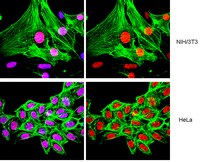17-10099 Sigma-AldrichChIPAb+ Acetyl-Histone H4 (Lys8) - ChIP Validated Antibody and Primer Set
The ChIPAb+ Acetyl-Histone H4 (Lys8) set includes the Acetyl-Histone H4 (Lys8) antibody, a negative control rabbit serum & qPCR primers which amplify a 134 bp region of human HSPCA.
More>> The ChIPAb+ Acetyl-Histone H4 (Lys8) set includes the Acetyl-Histone H4 (Lys8) antibody, a negative control rabbit serum & qPCR primers which amplify a 134 bp region of human HSPCA. Less<<Recommended Products
Overview
| Replacement Information |
|---|
Key Spec Table
| Species Reactivity | Key Applications |
|---|---|
| H, Yeast (S. cerevisiae) | WB, ChIP |
| References |
|---|
| Product Information | |
|---|---|
| Format | Serum |
| Control |
|
| Presentation | Anti-Acetyl-Histone H4 (Lys8) (rabbit polyclonal). One vial containing 50 μL of antiserum containing 0.05% sodium azide. Store at -20°C. Normal Rabbit Serum. One vial containing 100 μL of antiserum containing 0.05% sodium azide. Store at -20°C. ChIP Primers, HSPCA. One vial containing 75 μL of 5 μM of each primer specific for human HSPCA. Store at -20°C. FOR: GCA ACA GCT ACC ACA GGA CCA REV: GAG CGT GTG AAA TCA ACA TAA AGC |
| Quality Level | MQ100 |
| Physicochemical Information |
|---|
| Dimensions |
|---|
| Materials Information |
|---|
| Toxicological Information |
|---|
| Safety Information according to GHS |
|---|
| Safety Information |
|---|
| Packaging Information | |
|---|---|
| Material Size | 25 assays |
| Material Package | 25 assays per set. Recommended use: ~2 μL of antibody per chromatin immunoprecipitation (dependent upon biological context). |
| Transport Information |
|---|
| Supplemental Information |
|---|
| Specifications |
|---|
| Global Trade Item Number | |
|---|---|
| Catalogue Number | GTIN |
| 17-10099 | 04053252745959 |
Documentation
ChIPAb+ Acetyl-Histone H4 (Lys8) - ChIP Validated Antibody and Primer Set SDS
| Title |
|---|
ChIPAb+ Acetyl-Histone H4 (Lys8) - ChIP Validated Antibody and Primer Set Certificates of Analysis
| Title | Lot Number |
|---|---|
| ChIPAb+ Acetyl-Histone H4 (Lys8) - 2110549 | 2110549 |
| ChIPAb+ Acetyl-Histone H4 (Lys8) - 2395796 | 2395796 |
| ChIPAb+ Acetyl-Histone H4 (Lys8) - 2005942 | 2005942 |
| ChIPAb+ Acetyl-Histone H4 (Lys8) - 3175688 | 3175688 |
| ChIPAb+ Acetyl-Histone H4 (Lys8) - 3229616 | 3229616 |
| ChIPAb+ Acetyl-Histone H4 (Lys8) - 3386599 | 3386599 |
| ChIPAb+ Acetyl-Histone H4 (Lys8) - 3468470 | 3468470 |
| ChIPAb+ Acetyl-Histone H4 (Lys8) - 3727657 | 3727657 |
| ChIPAb+ Acetyl-Histone H4 (Lys8) - NRG1746201 | NRG1746201 |
| ChIPAb+ Acetyl-Histone H4 (Lys8) -2664300 | 2664300 |










